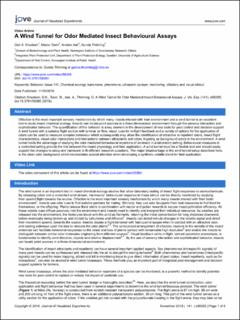| dc.contributor.author | Knudsen, Geir | |
| dc.contributor.author | Tasin, Marco | |
| dc.contributor.author | Aak, Anders | |
| dc.contributor.author | Thöming, Gunda | |
| dc.date.accessioned | 2022-07-25T13:42:28Z | |
| dc.date.available | 2022-07-25T13:42:28Z | |
| dc.date.created | 2018-12-05T09:57:43Z | |
| dc.date.issued | 2018 | |
| dc.identifier.citation | Journal of Visualized Experiments. 2018, (141), . | |
| dc.identifier.issn | 1940-087X | |
| dc.identifier.uri | https://hdl.handle.net/11250/3008341 | |
| dc.description.abstract | Olfaction is the most important sensory mechanism by which many insects interact with their environment and a wind tunnel is an excellent tool to study insect chemical ecology. Insects can locate point sources in a three-dimensional environment through the sensory interaction and sophisticated behavior. The quantification of this behavior is a key element in the development of new tools for pest control and decision support. A wind tunnel with a suitable flight section with laminar air flow, visual cues for in-flight feedback and a variety of options for the application of odors can be used to measure complex behaviour which subsequently may allow the identification of attractive or repellent odors, insect flight characteristics, visual-odor interactions and interactions between attractants and odors lingering as background odors in the environment. A wind tunnel holds the advantage of studying the odor mediated behavioural repertoire of an insect in a laboratory setting. Behavioural measures in a controlled setting provide the link between the insect physiology and field application. A wind tunnel must be a flexible tool and should easily support the changes to setup and hardware to fit different research questions. The major disadvantage to the wind tunnel setup described here, is the clean odor background which necessitates special attention when developing a synthetic volatile blend for field application. | |
| dc.description.abstract | A Wind Tunnel for Odor Mediated Insect Behavioural Assays | |
| dc.language.iso | eng | |
| dc.title | A Wind Tunnel for Odor Mediated Insect Behavioural Assays | |
| dc.type | Peer reviewed | |
| dc.type | Journal article | |
| dc.description.version | publishedVersion | |
| dc.source.pagenumber | 8 | |
| dc.source.journal | Journal of Visualized Experiments | |
| dc.source.issue | 141 | |
| dc.identifier.doi | 10.3791/58385 | |
| dc.identifier.cristin | 1639304 | |
| dc.relation.project | Norges forskningsråd: 244526 | |
| cristin.unitcode | 7502,4,17,0 | |
| cristin.unitname | Avdeling for skadedyrkontroll | |
| cristin.ispublished | true | |
| cristin.fulltext | original | |
| cristin.qualitycode | 1 | |
